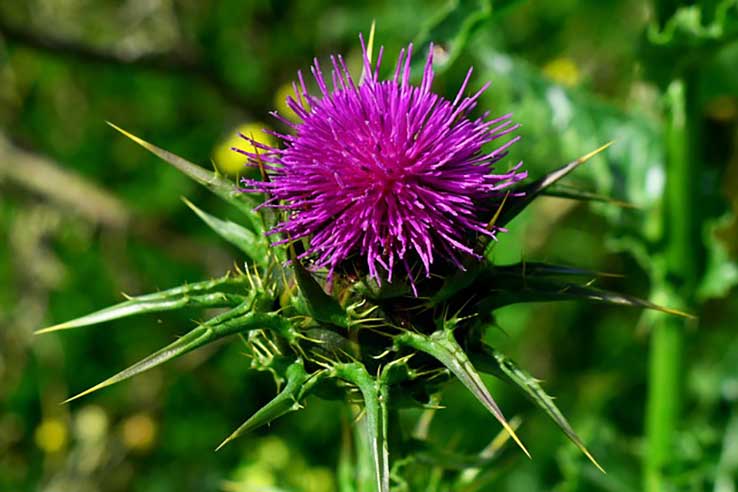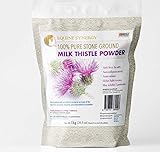Sign up to our newsletter for updates. We earn a small fee from some purchases through product links.
What Are The Benefits Of Milk Thistle For Horses?

Milk thistle is a plant with potent properties that could potentially be a game-changer for your horse’s health.
Notably, milk thistle is hailed for its ability to support liver and kidney health, enhance digestion, boost the immune system, and even promote skin health.
In this guide, we’re going to delve into everything you need to know about this powerful plant. We’ll explore its origins, the benefits it can offer your horse, how to correctly administer it, and importantly, we’ll address any potential side effects you should be aware of.
What Is Milk Thistle Used for in Horses?
Milk thistle is a plant that’s been used in humans for ages due to its beneficial health properties, particularly its liver-supportive qualities. More recently, it’s been found to offer similar benefits for our equine companions as well. If you’re a new horse owner or rider, you may find it interesting to learn how this humble plant could potentially contribute to your horse’s health.
The main active ingredient in milk thistle is a compound known as silymarin, and it’s this substance that packs the healthful punch. It’s especially known for its liver-boosting properties, acting as an antioxidant and anti-inflammatory agent that can protect this vital organ from toxins and help it recover from damage.
This could be particularly useful in situations where your horse has had a bout of illness that affected the liver, has been on certain medications which might put additional stress on the liver, or has been exposed to toxins in their feed or environment. In these cases, milk thistle can help the liver regenerate and restore itself more effectively.
But milk thistle isn’t just about liver health. It’s also thought to provide a range of other benefits. These include support for kidney function, aiding digestion, and providing anti-inflammatory and antioxidant benefits that may help protect against a range of health issues.
It’s important to note, however, that while milk thistle is generally considered safe for horses, like any supplement, it’s not a cure-all. It should be used as part of a comprehensive approach to horse health that includes a balanced diet, regular exercise, and routine veterinary care.
Also, remember that not all horses may need milk thistle. If you’re considering using it for your horse, it’s always a good idea to chat with your vet first. They can give you personalised advice based on your horse’s specific needs and health history.
Also, dosage is key. Over-supplementation can cause more harm than good, and while milk thistle is generally well-tolerated, it’s always recommended to start with a lower dose and closely observe your horse for any changes in behaviour, appetite, or overall health.
- Flushes out toxins and chemicals & encourages...
- Rich in nutrients and fibre ...the complete...
- Rich in Silymarin which can play a key role in...
- Bolsters & supports your horse’s immune system...
- Stone-ground for maximum nutritional content to...
Benefits of Milk Thistle for Horses
Delving further into the world of milk thistle, let’s take a closer look at the specific benefits this incredible plant can offer for our four-legged friends.
- Liver Support: The primary benefit of milk thistle is its support for liver health. Its active compound, silymarin, acts as an antioxidant and anti-inflammatory, helping the liver ward off damage from toxins. It’s particularly helpful if your horse has been exposed to toxins, been on medication that’s hard on the liver, or is recovering from a liver-related illness. By aiding in the liver’s regeneration process, milk thistle helps keep this vital organ in top shape.
- Kidney Health: While it’s most well-known for its liver benefits, milk thistle may also support kidney health. The kidneys, like the liver, help to remove waste products from the body, so any support in their function can be beneficial to your horse’s overall wellbeing.
- Digestive Aid: Milk thistle can also promote good digestion. It can help with the production of bile, which aids in the digestion of fats, and soothe inflammation in the digestive tract. If your horse has digestive issues, milk thistle may provide some relief.
- Antioxidant and Anti-inflammatory Properties: Milk thistle is packed with antioxidants, which help combat harmful free radicals in the body. This can help to reduce inflammation and protect against a range of diseases.
- Immune System Support: There’s some evidence that milk thistle can also help bolster the immune system, keeping your horse healthier overall and better able to fight off illnesses.
- Skin Health: Anecdotally, some horse owners have reported improvements in skin health and coat quality when using milk thistle. While not as well-studied as some of the other benefits, this could potentially be linked to its overall health-boosting properties.
But remember, while milk thistle has numerous potential benefits, it’s not a magic bullet. The best approach to your horse’s health is always a holistic one that includes a balanced diet, regular exercise, and routine check-ups with your vet.
Best Milk Thistle for Horses
Looking for the best milk thistle for your horse can be a bit daunting given the numerous options available on the market. Here are some key factors you should consider:
- Quality: Always opt for a high-quality product. This usually means a supplement with as few additives and fillers as possible. Ideally, you’ll want a product that clearly states it contains ‘silymarin’, the active ingredient in milk thistle known for its beneficial effects.
- Form: Milk thistle supplements come in various forms including powdered, liquid, and pellet form. The choice largely depends on your horse’s preference and what is easiest for you to administer. Many owners find that powdered supplements are the easiest to mix into feed.
- Dosage: The supplement should provide clear dosage instructions based on the weight of the horse. Be sure to follow these guidelines to ensure your horse is getting the optimal amount.
- Reputable Brand: Buy from a reputable brand known for its commitment to equine health. Reviews from other horse owners can be a good way to gauge a product’s effectiveness and quality.
A couple of recommendations that fit these criteria are:
- Flushes out toxins and chemicals & encourages...
- Rich in nutrients and fibre ...the complete...
- Rich in Silymarin which can play a key role in...
- Bolsters & supports your horse’s immune system...
- Stone-ground for maximum nutritional content to...
Are There Any Negative Effects of Milk Thistle
Generally speaking, milk thistle is considered safe for most horses when used at the correct dosage. However, as with any supplement, there’s always the possibility of some horses reacting differently or having sensitivities. Here are a few things to keep in mind:
- Digestive Upset: In some cases, horses may experience digestive upset, including bloating, gas, or loose stools when they start taking milk thistle. This is often a sign that the dosage might be too high and needs adjusting.
- Allergic Reactions: Although rare, some horses might be allergic to milk thistle. If your horse shows signs of an allergic reaction, such as hives, difficulty breathing, or swelling of the face, stop use immediately and consult with your vet.
- Drug Interactions: If your horse is on any medication, it’s crucial to speak to your vet before introducing milk thistle, as it could potentially interact with certain drugs.
- Over-Supplementation: Overuse of milk thistle could potentially cause issues. Always adhere to the dosage instructions on the package and consult with your vet if you’re unsure.
In general, starting with a lower dose and closely monitoring your horse for any changes in behavior, appetite, or overall health is a good way to introduce a new supplement like milk thistle.
Milk Thistle Recommended Doses & How Much to Feed Your Horse
When it comes to administering milk thistle to your horse, getting the dosage right is crucial. Too little might not provide the desired benefits, while too much could potentially lead to adverse effects.
Dosage can vary depending on the specific product you’re using, as the concentration of the active ingredient, silymarin, can differ from one supplement to another. Always check the instructions provided by the manufacturer on the package first. They usually provide dosage information based on the weight of your horse.
As a general guideline, a typical dosage for a horse might be around 1 to 2 tablespoons (or approximately 10 to 20 grams) of milk thistle seeds per day. However, do keep in mind that this can vary depending on the horse’s size, overall health, and specific needs.
If you’re using a liquid or extract, the dosage will be different, usually measured in milliliters. Again, refer to the product instructions for guidance.
It’s often recommended to start with a smaller dose and gradually increase it to the desired amount, keeping a close eye on your horse for any signs of digestive upset or other adverse reactions. And if your horse is pregnant, nursing, or has a medical condition, it’s even more important to consult with a vet before introducing any new supplement.
Powdered Vs Liquid Milk Thistle – Which Is Best for Your Horse?
The question of whether to use powdered or liquid milk thistle for your horse often comes down to two main factors: ease of administration and your horse’s personal preference. Both forms can be effective, but they do come with their own advantages.
Powdered Milk Thistle: This form is often easier to mix into your horse’s feed, which can make administration a bit simpler, especially if your horse isn’t a fan of new tastes. However, powders can sometimes be less palatable to some horses, and if your horse tends to be a picky eater, they might sort it out of their feed.
Liquid Milk Thistle: Liquid supplements, on the other hand, are typically easier for your horse’s body to absorb. They can be a good choice if you’re looking for fast-acting support. However, some horses might not like the taste, and liquids can be a bit more difficult to administer if your horse isn’t cooperative.
In terms of dosage, you’ll need to refer to the manufacturer’s instructions, as the concentration of silymarin (the active ingredient in milk thistle) can differ between products and forms. Generally, both forms should provide an effective dosage when used as directed.
At the end of the day, the ‘best’ form of milk thistle for your horse will depend on your specific circumstances and your horse’s preferences.
Remember, while milk thistle can provide numerous health benefits, it’s not a substitute for a balanced diet, regular exercise, and routine veterinary care. Always consider supplements as part of a holistic approach to your horse’s health.
Home / Health / Horse Feed & Supplements /Last update on 2024-04-27 / Affiliate links / Images from Amazon Product Advertising API


